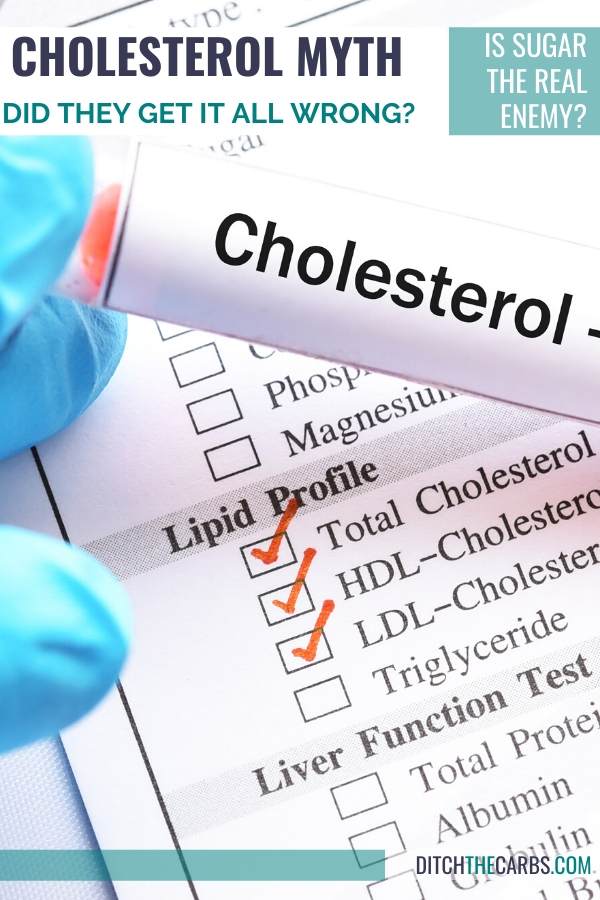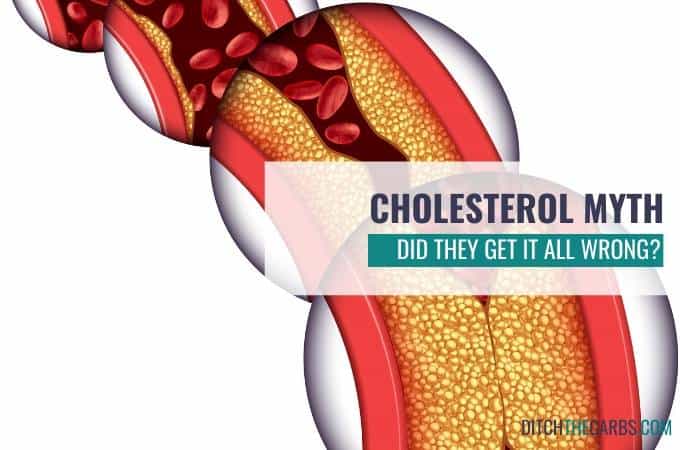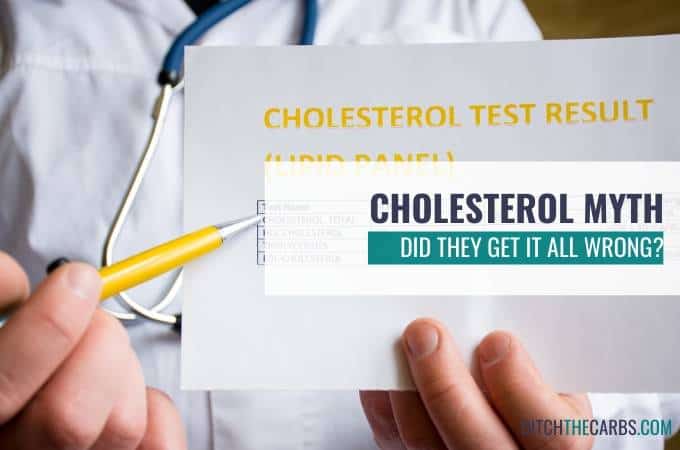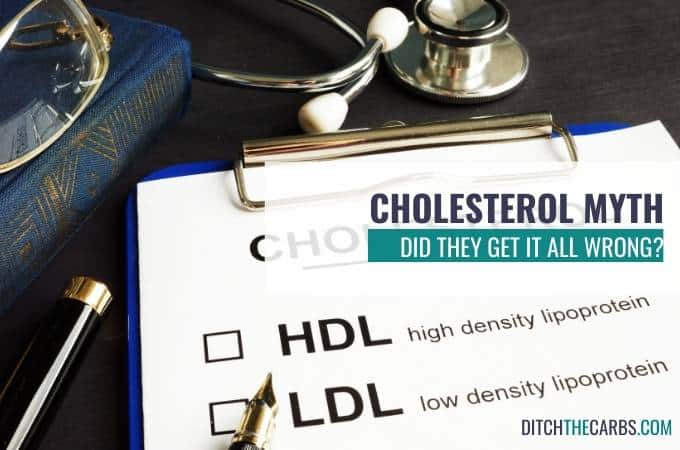Is high cholesterol dangerous? What are triglycerides?
Why do some people have high cholesterol and healthy hearts?
This study says no link between cholesterol and heart disease in the over 60’s. Is it time to ditch the statins? Top British cardiologist, Dr. Aseem Malhotra suggests it may be.

Medical Disclaimer -Before embarking on any change in diet, lifestyle or activity, you may need to be under the supervision and care of your primary healthcare provider. This article should not be construed as medical advice, nor should it be substituted for medical advice from your healthcare provider. By continuing to read this article, you assume all responsibilities and risks for instituting lifestyle management.
If you are confused about what to do next, find a Low-Carb Practitioners near you and discuss your situation and your results.
They will be able to explain your options and help you navigate a variety of blood tests or possibly a calcium scan which is a true reflection of your heart health, rather than a predicted ratio that has been calculated using population data.
Does Saturated Fat Clog Arteries?
According to this study published in the British Medical Journal, they say no, saturated fat does not clog arteries. In fact, they go even further to suggest that coronary heart disease is actually a chronic inflammatory condition.
No statins are required. The risks of developing heart disease can be effectively reduced from healthy lifestyle interventions.

- LDL cholesterol risk has been exaggerated.
- A high TC to high-density lipoprotein (HDL) ratio is the best predictor of cardiovascular risk.
- Coronary artery disease is a chronic inflammatory disease.
- Preventing the development of atherosclerosis is important but it is atherothrombosis that is the real killer.
- Postmenopausal women with CHD, greater intake of saturated fat was associated with less progression of atherosclerosis whereas carbohydrate and polyunsaturated fat intake were associated with greater progression.
- Coronary artery disease pathogenesis and treatment urgently requires a paradigm shift.
What Does Cholesterol Do In Our Body?

- Cholesterol is required by almost every cell in our bodies. It is so vital we are able to manufacture it. Cholesterol is predominantly made by your liver. Cholesterol is so vital we manufacture the bulk of the body’s requirements.
- Cholesterol is the structure which is the base of all our sex hormones, bile acid and Vitamin D is made from. Cholesterol maintains cell walls, allows cellular communication and transportation of substances.
- Cholesterol aids the body in fighting infection. When there is an infection present in the body, HDL goes down because it is used to fight the toxins, and this may be one of the reasons why cholesterol is found at the site of inflammation. But this is not to say that cholesterol is to blame for the inflammation, in fact, it could be the opposite, it is present to calm the inflammation.
Does Cholesterol Predict Heart Disease Risk?

Cholesterol is a poor predictor of heart disease. Half of those with heart disease have ‘normal’ cholesterol levels. Half of those with ‘high’ cholesterol levels have healthy hearts. Most heart attack victims have cholesterol within the “normal” range.
And should we eat a low-fat diet or a low-carb diet? The World Heart Federation president, Salim Yusuf, has presented the data from the PURE study on diet and cardiovascular disease. He concluded that fats protect us and carbs are harmful.
Inflammation is the real enemy of heart disease.
- Cholesterol is a poor predictor of heart disease. Half of those with heart disease have ‘normal’ cholesterol levels. Half of those with ‘high’ cholesterol levels have healthy hearts. Most heart attack victims have cholesterol within the “normal” range.
- It is the carrier of cholesterol (the lipoproteins LDL and HDL) which give a clearer indication of heart health. The concept of “Good” cholesterol HDL and “Bad” cholesterol LDL are outdated. We need to look at our particle sizes and patterns. Type A LDL are large fluffy particles that “looks like a cotton ball and does as much damage”. Type B is a small, hard, dense one which becomes oxidised and angry, sticking to the endothelium and creating inflammation. So you really need to know your particle size and how many of Type A or Type B you have. Just knowing your total LDL is not very helpful, to say the least.
- Eating more good healthy fat raises your level of Type A fluffy particles, eating more sugar raises the Type B angry little particles, which really causes the damage. There appears to be some evidence that high amounts of omega 6 oils can also increase LDL type B.
- How do you get higher levels of angry, sticky, heavy, dense LDL particles? Glycation. This occurs when there is too much glucose in the blood, yet again pointing to sugar being the ‘bad boy’. Sugar and carbs are far more detrimental to our health than dietary fat.
- Sugar causes inflammation. Sugar raises insulin which raises blood pressure, appetite, triglycerides and Type B LDL. Sugar in the blood attaches to proteins and causes AGE’s (advanced glycation end-products). High levels of circulating insulin may cause microvascular damage to capillary walls in kidneys, which increases blood pressure, and causes the kidneys to retain sodium, which collectively increases blood pressure.
- Sugar causes high triglycerides, which is by far the biggest danger sign for heart disease. Lower your sugar, lowers insulin, lowers triglycerides, lowers your risk.
- Cholesterol carriers are only a problem when they are oxidised (damaged). Once they are damaged, they stick to the lining (endothelium) of our blood vessels and starts the process of inflammation. “Cholesterol cannot accumulate in arteries without inflammation.”
- Inflammation is the true cause of heart disease. And what causes inflammation? You guessed it, high carb diet, high insulin levels, processed foods, stress, smoking, heavy alcohol use.
- Low cholesterol is not healthy. Low cholesterol is linked with depression, aggression, Alzheimer’s, suicidal thoughts to name a few. Cholesterol is required to make brain cells. You need cholesterol for memory and cognitive function. Read Lipitor – Thief of a Memory, written by a former astronaut who lost his memory after taking a statin to lower his cholesterol.
- Omega 3 fats are anti-inflammatory, Omega 6 fats cause inflammation. It’s the balance we must get right. Avoid Omega 6 fats (from processed vegetable oils such as canola oil, soy oil), and increase our Omega 3 fats – walnuts, flaxseeds, macadamia nuts, wild fish, grass-fed meat.
- The benefits of statins have been grossly exaggerated, the side effects have been underreported. There is a great debate going on with the statin lobbyists, and pharmaceutical companies to release their figures. There are class actions taking place in America against the statin drug companies, stating they knowingly have underreported side effects such as muscle damage, memory loss and diabetes. There is also research into the fact that statins reduce Co-enzyme Q10, an enzyme required by every mitochondria for energy transfer, causing muscle pain and damage (and what is the most important muscle in your body – ahhh, that would be your heart), may actually contribute to heart disease!!!
- Statins should never be prescribed for the elderly, most women and only in middle-aged men with a history of proven coronary heart disease. Statins are a multi-billion dollar industry, who are now encouraging treating patients with lower “normal” ranges, so to include more of the population. They lobby the notion that reducing cholesterol promotes good health, especially to Health Insurance Companies.
- The biggest side effects of statins are memory loss, muscle damage, diabetes, loss of energy and low immunity. Statins reduce hormone production, bile production and Vitamin D.
- Don’t go low-fat and wholegrain. You will not be doing your heart any favours. Eat low-carb, high-fat, unprocessed, real food.
- The bad science that got us into this mess of believing that fat causes heart disease, have all been proven to be inaccurate and flawed. The main two are Ancel Keys Seven Countries Study and the China Study.
- A low-fat diet has been shown to be worse for our health in almost every way. Going low carb high fat leads to better health outcomes and disease prevention.
- Well-meaning researchers wanted to cure the population of heart disease, only they jumped in too fast. They started writing food guidelines before all the research had been done and done well. They jumped the gun. And now the notion that fat makes you fat, eating cholesterol raises your cholesterol are ingrained in our beliefs and seem logical and true. But nothing could be further from the truth. It is this simple concept of “fat makes you fat, and eating cholesterol raises your cholesterol” actually requires a lot of science and understanding to de-bunk it and therein lies the problem. To prove a simple theory wrong, you have to have a great understanding to truly believe what is counterintuitive.
“Dietary factors and therapeutic lifestyle changes have no side effects. They should be considered the first line of defense in preventative cardiology”
New Study On Cholesterol
Is cholesterol dangerous? A new study on cholesterol in the over 60 reaffirms that cholesterol is not linked with heart disease or higher death rates. In fact, the inverse may be true. Cholesterol may be protective and help our mental function, helps us fight infections, and is vital for healthy hormone production.
Top British cardiologist, Dr. Aseem Malhotra suggests it may be time to rethink our use of statins and what it means to have a healthy heart.
Should You Worry About High Cholesterol?
- Is your cholesterol actually high? What are your LDL particle size and pattern? What about your triglycerides?
- Does the risk of taking a statin outweigh the risk of having a heart attack?
- Eat low-carb, high-fat and see your weight drop, insulin resistance reversed, HDL and Type A LDL improve and triglycerides fall.
- Cholesterol treatment and advice has not changed over the past few decades, whereas science has. The message is not getting out there because of the strong statin lobbyists, huge financial gains and rewards but the pharmaceutical industry, and research grants still available. Research is showing that cholesterol is not what we once thought it was, but it is not appearing in the clinical setting.
- What is your CRP reading (C-Reactive Protein is a marker for inflammation, which we know is the true cause of heart disease and all other major diseases).
- What is your calcium score? The true reflection of heart health.
Should You Worry About Statins?
If you’re on a statin (or your doctor wants you to go on a statin), take a look at Zoe Harcombe’s We Have Got Cholesterol Completely Wrong. She discusses six things you need to know about cholesterol, what is high cholesterol, is it, in fact, healthy, the side effects of statins, and the impending lawsuits.
“My top tip is: don’t have a cholesterol test and then you’ll have one fewer thing to worry about”.
Is Inflammation Dangerous?
Inflammation is caused by processed foods, omega 6 fats, trans fats, seed oils, stress, and a high sugar diet. And what calms inflammation? Cholesterol. That’s right, cholesterol is trying to ‘patch up’ areas of damage to the blood vessels.
- Cholesterol Testing – Gary Fettke No Fructose
- The Straight Dope On Cholesterol – Dr Peter Attia, MD
- YouTube Channel Low Carb Playlist
Are Triglycerides Important?
Yes, raised triglycerides are a direct reflection of your ability to metabolise carbohydrates, obesity, metabolic syndrome, and uncontrolled Type 2 diabetes.
Cholesterol is not the best predictor of heart health – triglycerides are.
5 Things You Need To Do For A Healthy Heart

- Don’t smoke. Don’t drink alcohol to excess.
- Exercise moderately.
- Maintain a healthy weight.
- Eat whole, unprocessed foods, with plenty of omega 3 fats and improve gut health.
- Manage stress.
But where is cholesterol mentioned here? It’s not, because it is of little real value. The best indicators for long life are high HDL, low triglycerides, and low insulin levels.
Stress contributes to almost every disease known. It affects our ability to recover, our immunity, inflammation, blood pressure, overproduction of platelets (which start blood clots that block arteries), and adrenal depletion.
How you deal with stress and cope with stress is vital to your health and well-being.
Best Books On Cholesterol
The Cholesterol Myth – Why lowering your cholesterol won’t prevent heart disease. Cholesterol levels are a poor predictor of heart disease and standard prescriptions for lowering it, such as low-fat diets and statins, obscure the real causes of heart disease.
The Great Cholesterol Con – Dr. Malcom Kendrick will change the way you think about cholesterol forever.
Lies My Doctor Told Me – Dr. Ken D. Berry, MD. Medical myths that can harm your health.
References & Further Reading
- BMJ study – Lack of an association or an inverse association between low-density-lipoprotein cholesterol and mortality in the elderly: a systematic review
- 1: Is atherosclerosis caused by high cholesterol?
- 2: Towards a Paradigm Shift in Cholesterol Treatment. A Re-examination of the Cholesterol Issue in Japan
- 3: Lipoprotein Aggregates Complexed with Microbial Remnants and LDL Autoantibodies
- 4: High cholesterol may protect against infections and atherosclerosis
- 5: Virus induced inflammation and cancer development
“For decades, the mainstream view has been that an elevated level of total cholesterol (TC) is a primary cause of atherosclerosis and cardiovascular disease (CVD). There are several contradictions to this view, however. No study of unselected people has found an association between TC and degree of atherosclerosis”. (1)
“Moreover, in most of the Japanese epidemiological studies, high TC is not a risk factor for stroke, and further, there is an inverse association between TC and all-cause mortality, irrespective of age and sex”. (2)
“It is well known that total cholesterol becomes less of a risk factor or not at all for all-cause and cardiovascular (CV) mortality with increasing age, but as little is known as to whether low-density lipoprotein cholesterol (LDL-C), one component of total cholesterol, is associated with mortality in the elderly…” the study published in the British Medical journal decided to study this further.
The BMJ Study
They identified 19 studies, with a total of 68094 elderly participants where all-cause mortality was recorded.
Their conclusion was high LDL-C is inversely proportional to mortality in most people over 60 years. This is inconsistent with the current cholesterol hypothesis.
“Since elderly people with high LDL-C live as long or longer than those with low LDL-C, our analysis provides reason to question the validity of the cholesterol hypothesis.”
The study suggests “re-evaluation of guidelines recommending pharmacological reduction of LDL-C” ie: statins.




